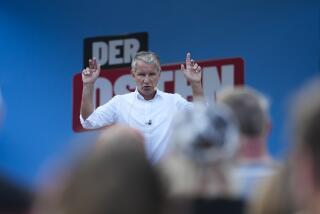Conservatives in Kohl’s Party Form New Wing : Germany: The move comes as surveys show the chancellor’s Christian Democrats losing supporters to an extreme-right grouping.
BERLIN — In a move reflecting the present swing to the right in German politics, nearly 200 prominent members of Chancellor Helmut Kohl’s Christian Democratic Union on Saturday formed a new wing within the party whose aims include a rejection of “the utopia of a multicultural society” for Germany.
One of the group’s founders, Baden-Wurttemberg member of Parliament Claus Jaeger, said the goal of the movement--named the Christian Conservative Forum--would be to influence the party’s platform in advance of the next set of elections in 1994.
The group includes 11 members of Parliament and several state legislators and held its inaugural meeting in Bonn despite the strenuous objections of the Christian Democrats’ leadership.
In addition to Jaeger, a second Bundestag member, Rudolf Krause, and Saxony state legislator Wolfgang Nowak were elected spokesmen for the group, which immediately presented a 20-point plan that included toughening police powers, tightening asylum laws and accelerating procedures for expelling foreigners convicted of committing a crime in Germany.
“Those who hold genuine conservative views no longer feel themselves represented within the party,” Jaeger said. “A lot of people are frustrated.”
The move comes at a time when internal party surveys show the Christian Democrats losing supporters to the extreme-right Republikaner, an unabashedly nationalistic party led by a former member of Hitler’s infamous Waffen SS.
In Jaeger’s home state of Baden-Wurttemberg last April, the Republikaner scored a surprising 10.9% of the vote--a showing that was a key factor in the Christian Democrats losing control of the state.
“This is one reason why we have to do something,” Jaeger said. “If things go on as they are, the Republikaner will continue to sap our strength.”
A series of factors, including social tensions stemming from the influx of nearly three-quarters of a million foreigners seeking political asylum during the past three years and the failure of the main parties to tackle key problems, have combined to shift the German political spectrum to the right.
The national mood at the heart of this swing helps explain, at least in part, the tacit public support that has so frequently accompanied attacks on asylum seekers by gangs of violent extremist youths.
The fear of losing more voters to the extreme right is often cited as one reason why Kohl has never visited the site of an attack or openly shown solidarity with the victims.
Still, the Christian Democrats’ General Secretary Peter Hintze denounced the forming of the new wing as an attempt to split the party, labeling it “an underhanded attack on the Christian Democrats’ leadership (based on) defamatory claims and obtuse conspiracy theories.”
As the conservative group met for the first time, leaders from all mainstream German parties failed yet again after several hours of talks in Bonn on Saturday to agree on the wording of a constitutional amendment for limiting asylum seekers.
The country’s present law allows automatic entry to all those declaring a need for asylum and permits them to stay in the country until the claim is checked--a process that can take years and often has done so.
Party representatives have held marathon talks during the past two weekends but are said to have been unable to narrow their differences significantly on the issue.
Because a two-thirds parliamentary majority is required to amend Germany’s constitution, approval of both the Christian Democrats and the main opposition Social Democrats is needed. Saturday’s impasse comes amid mounting voter frustration at the inability of the main parties to resolve the problem.
Elsewhere in Germany, authorities banned two right-wing extremist rallies in the Bavarian towns of Passau and Straubing, while in Berlin scuffles broke out between protesters and police as about 3,000 left-wing anarchists and Turks marched against right-wing violence.
More to Read
Sign up for Essential California
The most important California stories and recommendations in your inbox every morning.
You may occasionally receive promotional content from the Los Angeles Times.










